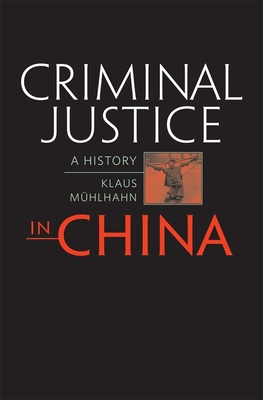

 Harvard University Press
Harvard University Press
Criminal Justice in China: A History


Key Metrics
- Klaus M�hlhahn
- Harvard University Press
- Hardcover
- 9780674033238
- 9.34 X 6.48 X 1.11 inches
- 1.59 pounds
- Law > Legal History
- English
 Secure Transaction
Secure TransactionBook Description
In a groundbreaking work, Klaus M hlhahn offers a comprehensive examination of the criminal justice system in modern China, an institution deeply rooted in politics, society, and culture.
In late imperial China, flogging, tattooing, torture, and servitude were routine punishments. Sentences, including executions, were generally carried out in public. After 1905, in a drive to build a strong state and curtail pressure from the West, Chinese officials initiated major legal reforms. Physical punishments were replaced by fines and imprisonment. Capital punishment, though removed from the public sphere, remained in force for the worst crimes. Trials no longer relied on confessions obtained through torture but were instead held in open court and based on evidence. Prison reform became the centerpiece of an ambitious social-improvement program.
After 1949, the Chinese communists developed their own definitions of criminality and new forms of punishment. People's tribunals were convened before large crowds, which often participated in the proceedings. At the center of the socialist system was reform through labor, and thousands of camps administered prison sentences. Eventually, the communist leadership used the camps to detain anyone who offended against the new society, and the crime of counterrevolution was born.
M hlhahn reveals the broad contours of criminal justice from late imperial China to the Deng reform era and details the underlying values, successes and failures, and ultimate human costs of the system. Based on unprecedented research in Chinese archives and incorporating prisoner testimonies, witness reports, and interviews, this book is essential reading for understanding modern China.
Author Bio
Professor Dr. Klaus Mühlhahn from Berlin, social scientist and specialist in cultural studies, is the new President of the ZU. Born in Constance, was elected by the ZU Senate and officially appointed to his position as President and also appointed as Director by the ZU Foundation, the supporting foundation of the ZU.
Professor Mühlhahn is currently the Vice-President of Research at the Freie Universität (FU) Berlin. He will take up his post in Friedrichshafen by September 1st for five years.
In 1993 Mühlhahn received a Master's degree in Sinology from the Free University of Berlin, where he also worked as research assistant from 1993 to 2002 in the Department of Sinology. In 1998 he received his Ph.D. in Sinology at the FU Berlin with his dissertation "Herrschaft und Widerstand in der 'Musterkolonie' Kiautschou". From 2002 to 2004 he was visiting fellow at the Center for Chinese Studies, at University of California, Berkeley.
From 2004 to 2007 he was Professor of Contemporary Chinese and Asian History at the Institute for History of the University of Turku. In 2007-2010 he was Professor of History and Associate Professor of East Asian Languages and Cultures at the Indiana University in Bloomington. Since 2010 he has been Professor of Chinese History and Culture at the FU Berlin and since 2014 vice president.
In 2009 Mühlhahn was awarded the John K. Fairbank Prize of the American Historical Association for his book Criminal Justice in China: A History.
Source: Zepplin University, Wikipedia, and Freie University of Berlin.
Videos
No Videos
Community reviews
Write a ReviewNo Community reviews